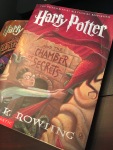
I did my 5-part series about JK Rowling’s Harry Potter, but as of that point I hadn’t actually finished the book.
Now I have.
So here’s the rest of my analysis.
Well, the chapters 11 through 13 were kind of slow. Take your pick; 12 through 14 or 10 through 13, but they’re a little soft.
And why?
Because we’re not learning new magical things. We’re no longer diving deeper into the wizarding world, we’re just existing in that world. That’s neither good nor bad, it’s just not as interesting.
In order for a roller coaster to have the big hill with the big drop, it has to go up AND it has to go down.
No downs = no ups. All flat.
And all potentially less interesting as a result.

Anyway, in chapter 15 there’s a big old “as you know, Bill”-style info dump between the centaurs. Normally, I’d throw a yellow card on that but I’m gonna waive it off because it’s a kids’ book. I personally think that if Rowling had written this book today she would have changed a few things – but she didn’t write it today. She wrote it in the ’90s and it’s wildly popular so I’m just going to sit over here and grumble to myself.
Oh, and while we’re at it – I guess Stephen King can go blow himself over that “the road to hell is paved with adverbs” nonsense. There’s an adverb every 10 seconds in this book. Nobody seems to mind.
Again, worlds’ most popular author.
The centaurs – having not appeared before – seem to have been brought in just for this one scene. It makes sense if they live in the forest and they’re the reason I’m not supposed to ever go into the forest, but suddenly introducing them now seems a little… convenient. (That doesn’t contradict what I just said about diving deeper into the wizarding world, either. I don’t think.)
Somebody would’ve mentioned them before now, probably. Hagrid or somebody, even in passing. They mentioned other things, why not centaurs?
So that’s another minor issue but nonetheless – I wouldn’t recommend anybody I work with trying it.


I’d tell you to plant it somewhere earlier. A passing reference. Something. No reason not to. The two wizards sitting in the wall in the very beginning could have made some kind of comment about it. Anybody, really. (And if they had, nobody’d remember that, so I’d also add that you refer to centaurs again somewhere so readers remember them. Have one character tease another one about why they’re always going on about centaurs.)
Harry paces up and down in front of a fire.
For all of those who hate when I say “paces back-and-forth”: Nyah, Nyah!
In chapter 16 there’s kind of a major screwup. They start talking about broomsticks but nobody has said there are any broom sticks – the flying kind – anywhere in the room. They need these to catch the flying key. Harry says, “Yes, to the broom sticks” – well we didn’t know they were any broomsticks. It’s like an idea, “We need broomsticks!” instead of “Look! There are some broomsticks over there in the corner. Let’s use those!”
 Sorry, that’s major. I had to go back and re-read two pages to see where the damn broomsticks were mentioned. How’d I miss that? She didn’t mention them, that’s how. Harry just says it. Prior to that, they aren’t in the scene. You can’t do that (although, if you’re the world’s most famous writer, apparently you can.)
Sorry, that’s major. I had to go back and re-read two pages to see where the damn broomsticks were mentioned. How’d I miss that? She didn’t mention them, that’s how. Harry just says it. Prior to that, they aren’t in the scene. You can’t do that (although, if you’re the world’s most famous writer, apparently you can.)
BTW, my wife was driving us back from skate night as I read this part aloud to our daughter. Savvy hung on every word, eating ice cream and conjuring up Harry Potter in her head.
Playing their way across the giant chess room? Harry says it’s obvious. It’s not. I’d have just walked across. Well, no, I wouldn’t have. I’d have thrown rocks at my characters. But it still wasn’t obvious. I’d have had them start walking across and have that not work because they didn’t play. THEN it would be obvious.
Later in 16, Hermione doesn’t explain how she knows which bottle does what, she just knows. Unless I missed something.
Oh. She rereads the logic puzzle and solves it. Okay, never mind.
 Oh, and then a chapter break just for the sake of suspense, not because it’s actually a scene break. Going from 16 to 17, Harry just walked through the fire after drinking one of the seven potions. There was already someone there – but it wasn’t Snape. It wasn’t even Voldemort. Who was it? End of 16 start of 17: It was Quirrell.
Oh, and then a chapter break just for the sake of suspense, not because it’s actually a scene break. Going from 16 to 17, Harry just walked through the fire after drinking one of the seven potions. There was already someone there – but it wasn’t Snape. It wasn’t even Voldemort. Who was it? End of 16 start of 17: It was Quirrell.
I’m not allowed to do that. My editor won’t let me. Wonder if she’s reading this.
Then a bad guy monologue…. or two.
And a nice twist! Or two. Bravo.
But don’t get cocky. It’s still very telly.
But a pretty good mystery. Pretty good. I find myself smiling.
Pretty darned good.
Okay, I’m in. I’m a fan. I don’t know if it’s the best book ever written but it has a great adventure unfolding in a whole new world, and that’s pretty special.
Nice work, Rowling.
But there’s work to be done.
On to the chamber of secrets!
.

17 replies on “Finishing up with Harry”
I’m glad you enjoyed the book! I loved it. The novel could serve as a great lesson to writers in one very important way. The rules of writing don’t matter as much as the story itself. Make the plot AWESOME, you can throw a few rules out the window.
LikeLiked by 2 people
I agree. I was also thinking about your comments along the lines of the heroes journey. Outlining the story about harry Potter and the sorcerer stone, a Fan would very quickly come up with a good outline for any type of mystery. Not to do what the exact things Rowling did but to say at this point have this type of thing happen. It’s a very well laid out mystery and a compelling adventure. Not too shabby!
LikeLiked by 1 person
You bet. The hero’s journey can be manipulated so many different ways. This is another great example of creativity within the outline.
LikeLiked by 1 person
Yrp. You should totally do a presentation on that sometime.
LikeLiked by 1 person
I think I might. 😉 Check back with me in Altamonte Springs in 11 months or so.
LikeLiked by 1 person
Done deal.
LikeLike
These were fun to read! The pics were nice additions.
And yes, your editor is reading this. There’s a typo in that sentence. Hehe. 😉
LikeLiked by 1 person
Ha.
Ha.
LikeLike
OK I fixed “it”
LikeLike
I’ll be honest, you’re going to get more annoyed. Her work actually gets more telly, more adverbs, more plopped information as the books go on. But I think her work is an example of, “If your story is compelling enough, people will ignore everything else.”
LikeLiked by 1 person
It’s a good story and maybe it’s a great story, but I’m looking at who distributed. Getting through scholastic, where it may have caught on with a bunch of school kids to send it to ride the fad, I don’t know. But for it to last as long as it has, it doesn’t much matter. Fads don’t last. Classics do. But as I explore the books, I am seeing what I will politely call borrowed themes.
That’s neither good nor bad. Star Wars borrowed it from somebody else and good versus evil has been around forever, but The Harry Potter stories are unique in their own way.
It’s what I call layering. It’s one thing to say a boy figures out that he is a wizard it goes off the wizard school, it’s another thing to think of all the names of the things that exist in that world, to have goblins be the bank tellers at the wizards bank, or to have a word for people who are what you are – non-magical, Muggles.
To layer in the things that would be common in that world, that’s pretty neat. I’m enjoying that a lot.
But I am also enjoying the fact that it is a well told story. A mystery. And it’s interesting in its own right even if it wasn’t about magic.
LikeLiked by 1 person
I agree with the others that what makes the books so successful is the story, and readers — especially younger ones — are clearly willing to overlook the writing “mistakes” that the experts keep telling us to avoid. I know I really enjoyed the books and don’t remember getting that slowed down by glitches (although I hadn’t started really writing myself yet; I wonder if it would be different now).
But then, I’ve read that Rowling pitched this book to some ridiculously high number of publishers before she finally got it published. I wonder if the writing had been tighter, maybe the first one would have been accepted more readily. That is to say, it doesn’t hurt to have a great story AND tight writing.
LikeLiked by 1 person
That’s fair.
I think if she were writing stories today, she might write it more in the style of how we speak today. Maybe fewer adverbs .
And the fact that she had to pitch it to everybody – and everybody rejected it – it’s testament to two things. That the people in charge don’t know what the hell they’re doing, and this writing business isn’t easy. A really really good story like this got overlooked by just about everybody.
But your final point is also true. Maybe changing some of those things would have made her journey less difficult. But we will never know, because since she’s human, she would’ve started changing the adverbs and undoubtedly would’ve changed some other things too, and changing those other things may have made it even more difficult for the story to be accepted.
I think it’s worth looking at the fun of the stories, the way they engage teaders of all ages, and using it as a role model for our own writing. She was able to do what she did. We might not be able to do what she did. But we can certainly make our path less difficult by doing things that we know should be done today.
LikeLiked by 1 person
I totally agree about the lessons of how many rejections she went through — it’s a tough business, and that’s partly because the gatekeepers don’t always recognize the good stuff when they see it.
I also agree that we can learn a lot about how she made the stories fun and engaging, and try to apply some of those lessons to our own writing.
Rowling *is* writing new stories today, which makes me wonder whether she has changed her writing style or if she’s still doing what’s worked fine enough in the past, particularly if nobody is giving her feedback to the contrary. Reminds me that I was talking to a famous writer two weeks ago and he was bragging that his editor never tells him to cut anything. I was thinking, “Hm, so if you weren’t so famous, you’d be getting more constructive feedback from your editor?”
LikeLiked by 1 person
I think that happens to all of us. Editors can can suggest whatever they want, but in the end it’s up to us to decide what stays or goes. Including the editor.
When I am initially done writing a manuscript, I am defensive as hell about it. After a month, I can reread it and see a lot of things that need to be fixed or come out. A month later, I can look at suggestions from my editor and I basically take the approach of: 99% of this is still me and my choices even if I take every single suggestion of hers – and since I trust her and she has my best interest at heart, why would I not take every one of her suggestions? Unless it’s something serious, I really try to take every suggestion she gives me.
But it starts with trust, and then it goes to the beta readers. If they all flag a correction that she made, in other words, if they are suggesting I undo something she suggested I do, then we’ll undo it. Nobody’s perfect and it’s not an exact science. I do my best and then my editor does her best and when it’s the other way around, when she writes something, I do my best to make editing suggestions, so we both end up with this product we can produce.
LikeLiked by 1 person
It sounds like you have a great relationship with your editor, and a healthy approach to the whole process. I think everyone has that initial response to criticism, at least when you’ve handed in something you thought was really solid. I mean, deep down, we all want the other person to say, “Wow, that’s perfect, just the way it is!” But it never is, is it? At least getting and taking (and giving) constructive feedback seems to get easier the more I do it, so that’s a good sign, I think.
LikeLiked by 1 person
Definitely, the more you give in and get criticism, easier it is to accept it and parcel out what’s good and what’s not. When a typical person joins a critique group, inside of 90 days they have developed a hide thick enough for an elephant and their writing has improved dramatically.
For the quick.
And, yes, I’m very fortunate. I Love my editor.
LikeLiked by 1 person